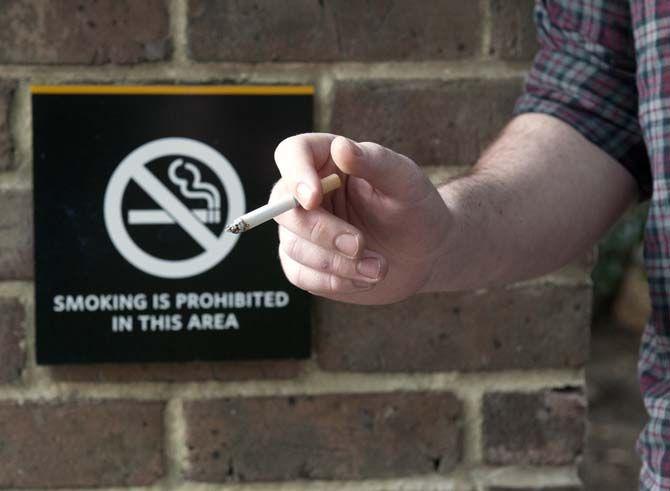The University became smoke-free on Aug. 1, 2014. All ashtrays were removed from campus, and signs were placed to inform everyone of the anti-smoking regulation. These preparations were made to prevent smoking; these preparations did not work.
By creating a smoke-free environment, the University intended on saving $37,000 that was normally spent on cleaning up cigarette waste. In addition, the new enforcement was designed to preserve the campus from harmful cigarette waste as well as prevent the dangerous effects of secondhand smoke. With such a crowded campus, smoking will inevitably cause asthma attacks amongst those sensitive to smoke.
While these intentions are considerate to both the campus and those who preside in it, they only work if the ruling is enforced. In the official releasing, the rule states a faculty member must warn a student several times before any form of discipline is given. This statement assumes faculty members will take initiative. Even then, the list of disciplinary actions is wide and vague, allowing anything from “discussing the matter with the tobacco user immediately” to imposing “appropriate disciplinary sanctions.”
This lack of enforcement or strictly defined consequences allows for unregulated smoking at worst and unfair inconsistency at best. While I do support the University as a smoke-free campus, it is always better to remove an unjust rule than to allow inconsistent discipline. An ideal solution would be to restructure the regulation entirely.
The University turns a blind eye to the fact there are still many who smoke on campus. After the school removed all ashtrays, smokers have been encouraged to discard their cigarettes wherever they please, namely the ground and benches. In addition, though smokers have asked for designated smoking areas away from the public, the University has put no effort into changing its stance. This stubbornness leaves unruly smokers to rebel by designating their own spots to smoke, like the “smokers’ bench,” an area right outside of Middleton Library with heavy foot-traffic. The school’s refusal to compromise or facilitate smoking jeopardizes the environment as well as people’s health.
Secondhand smoke can cause nearly 34,000 heart disease deaths each year. Even worse, these deaths are some of the most preventable. By smoking, not only are you putting yourself at risk but the lives of everyone around you. Even if the University refuses to enforce the anti-smoking rule, many of the harmful effects can be avoided simply by being considerate. If smokers can simply avoid crowded areas while smoking, others can be spared from secondhand smoke. If they can discard waste properly, campus will benefit. Everyone would win. With college’s lack of discipline, it is often put upon the students to act maturely and act for the betterment of others.
The current ruling is both unjust and detrimental to all parties. Smokers receive inconsistent consequences; others receive secondhand smoke and cigarette waste. Until the University restructures its unsound ruling on smoking, it is the responsibility of the students to act in a way that is fair to all.
Ethan Gilberti is a 19-year-old English sophomore from New Orleans, Louisiana.





